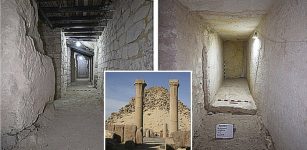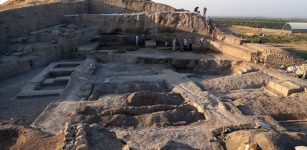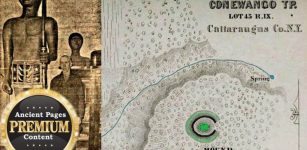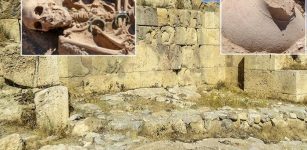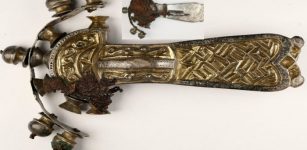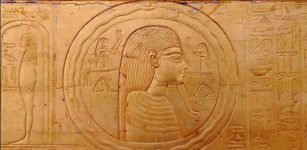5,000-Year-Old Stone Paint Palette Unearthed In Küllüoba Mound
Conny Waters - AncientPages.com - A 5,000-year-old stone paint palette believed to be used for painting bowls was unearthed in excavations conducted at Küllüoba settlement mound located in the Central Anatolian province of Eskişehir.
 An aerial view of the excavation site in Küllüoba. Image credit: AA
An aerial view of the excavation site in Küllüoba. Image credit: AA
Archaeologists have investigated the ruins of Küllüoba since 1996, and their results show that the site was inhabited continuously from 3500 BC until 1900 BC.
The Küllüoba excavation director, associate professor Murat Türkteki, noted that Küllüoba was located on one of the trade lines passing through the region.
“It is one of the settlements on the trade line extending from northern Syria to the Balkans from 2,400s to 2,300 B.C. It is certain that this plain was used for caravan trade. Control of the plain was also provided by Küllüoba.”
During the earlier phase of the long-lasting Küllüoba excavation works, the researchers found traces of urban building styles, independent public structures, and evidence of the existence of a land road nicknamed by researchers - the “Great Caravan Route” between Mesopotamia, the ancient region extending from Iraq into present-day southeastern Turkey, to the city of Troy, in modern-day Çanakkale, in northwestern Turkey.
There were also Hellenistic settlements on the foot of the mound, which uninterruptedly includes the prehistoric periods from 3500 B.C. to the beginning of the Middle Bronze Age in 1900 B.C. Traces of the Bronze Age are searched in the mound, which is 350 meters long and 150 meters wide and located 15 kilometers northeast of Seyitgazi district center.
 The 5,000-year-old paint palette unearthed in Eskişehir province's Seyitgazi district, northwestern Turkey. Image credit: AA
The 5,000-year-old paint palette unearthed in Eskişehir province's Seyitgazi district, northwestern Turkey. Image credit: AA
Excavations at Küllüoba were launched in 1996. Since then, researchers have discovered artifacts, animal bones and settlement plans revealing details about the cultural life 4,500 years ago. Fifteen burial sites were discovered along with a 3,000-year-old sarcophagus.
During the 2020 season, the researchers will focus on the residential area of the period trying to establish a link between the structures of this community and the earliest settlers living in the cemetery site, the location of which was determined last year.
Expressing that they excavated areas covering 3000s B.C. this year, Türkteki said that the settlement in Küllüoba was very large since the beginning of the first Bronze Age.
“We found that domestic production was made in every house. Inside each house, there is a stove and oven. We can say that woven and clay pot production was made. One of our important findings this year is that we found red-colored paint residue in a container. Painted pottery was also found in the same area,” Türkteki said.
“There are traces of paint residues in it. In the palette we found, red paint residues look very good. We think this palette was used for painting containers. We can date the palette to 2,900-3,000 years B.C. We will make an analysis of paint marks in the coming days. We will carry out its content and pigment analysis. An important and exciting find, as it is a find we have not encountered before,” he added.
Written by Conny Waters - AncientPages.com Staff Writer




